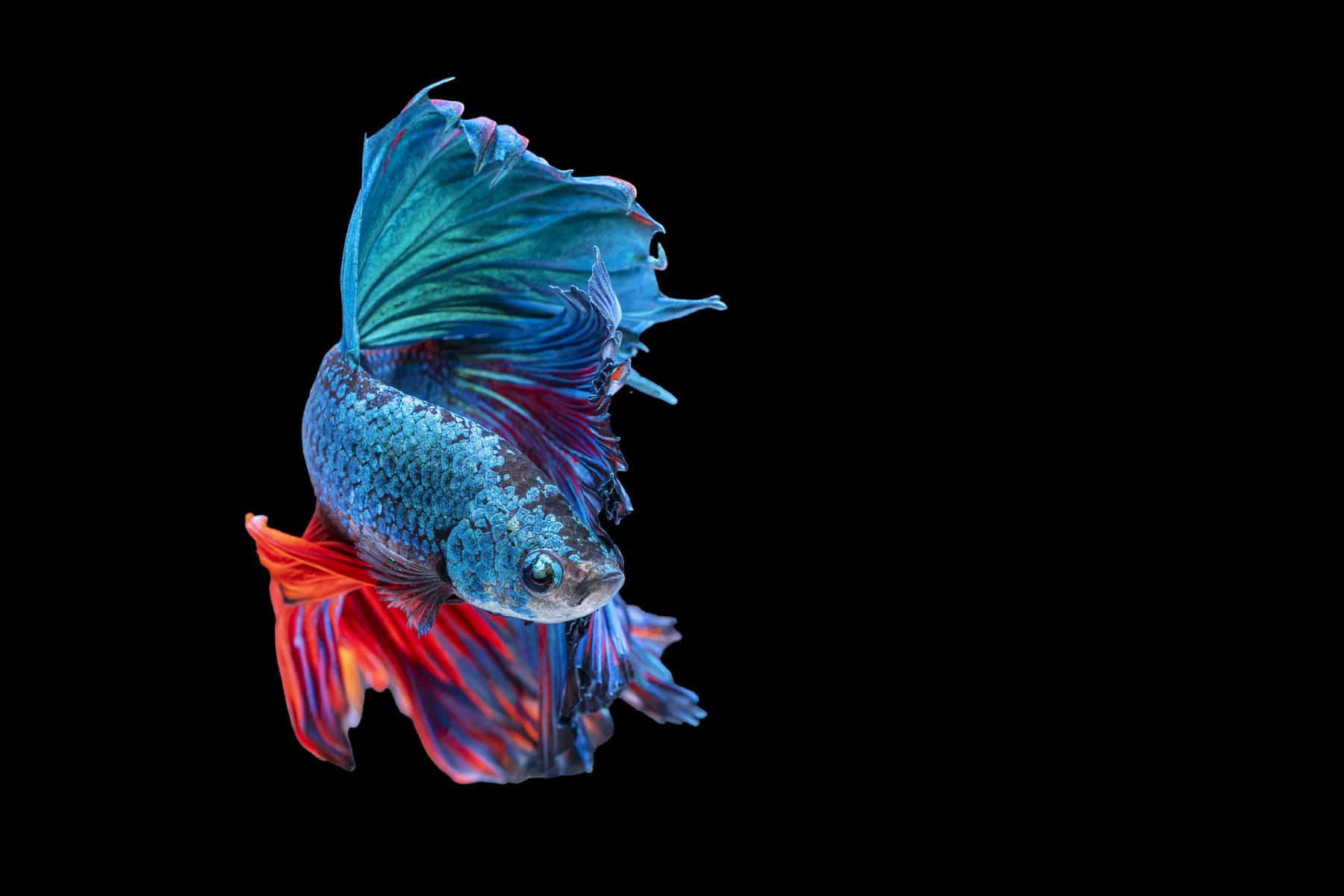If you’ve ever seen a betta fish with shiny eyes looking a bit disorientated, it may have been a case of Diamond Eye.
The diamond eye is a genetic disorder that can, unfortunately, blind a betta fish. Here we’ll take a closer look at this rare condition and help you learn how to care for a betta with a diamond eye.
What Is a Diamond Eye?
Diamond Eye is a genetic condition in certain species of fish that causes scales to grow over one or both of their eyes.
Fish with this affliction typically have glinting scales where their eyes once were, hence the name ‘diamond eye’.
The disorder results in partial or total blindness, and bettas with diamond eyes can sometimes become blind in their few months of life. In other cases, the scales may grow over the eyes over the course of more than a year.
It’s a rare condition in betta fish and tends to affect certain breeds more than others.
Which Type of Bettas Is at Risk From the Diamond Eye?
Due to genetic variation, the diamond eye is theoretically possible in all bettas, but it is much more common in certain breeds than others.
Metallic bettas, Marble bettas, and Dragon Scale bettas are the three types of bettas most commonly associated with Diamond Eye.
Dragon Scale bettas are a particularly susceptible breed, leading some betta keepers to call the condition “dragon eye.”
Are There Any Treatments for the Diamond Eye?
Sadly there are no effective treatments for Diamond Eye. While in larger fish species, surgery may be possible, it’s very difficult to achieve good results in bettas.
Betta fish eyes are so small that removing the scales is incredibly difficult without further damaging the eye. Therefore, surgery is a very unlikely option for Diamond Eye in bettas.
How Can I Prevent Diamond Eye?
There are no known effective preventative measures for Diamond Eye either.
Sime aquarists suggest adding tannins to the water in the form of banana leaves or Indian almond leaves. However, this shouldn’t be advised since the very high levels of the tannins needed in the water would thin all scales on the fish, not just those covering the eyes.
To lessen your chances of buying a betta with Diamond Eye, you could choose a breed of betta that is less likely to develop the condition.
If you decide to purchase a Metallic, Marble, or Dragon Scale betta, take a close look at their eyes before buying. If you see any scales encroaching onto the eyeball, steer well clear and alert the store’s staff of the issue.
Is Diamond Eye Contagious?
Diamond Eye is a purely genetic condition and won’t transfer to other members of your tank.
If you were to breed from a male or female betta with the condition, however, there would be a high likelihood that some offspring would also inherit the condition.
My Betta Has Bulging Eyes; Could It Be a Diamond Eye?
Almost certainly not. Bulging eyes are normally a symptom of exophthalmia. Or “pop eye” – a condition caused by fluid buildup inside or at the back of a fish’s eye.
Pop eye is a serious and painful ailment that should be treated immediately. Read our full guide here for more information on the pop eye in betta fish.
Does Diamond Eye Cause My Betta Distress?
Not necessarily. As far as we know, the actual condition isn’t painful, and your betta may go on living a good quality of life even if absolute blindness results.
This depends greatly on the level of care you’re willing to offer your blind betta, which we’ll come onto in a moment…
Does a Diamond Eye Betta Fish Need Light?
Yes! Even if scales have grown completely over his eyes, the diamond eye doesn’t affect your fish’s retinas, so he’ll still be able to perceive light.
Keeping your tank lights on during the day and switching them off at night will help your betta orient the time of day and feeding times. Good lighting is also essential for any live plants or beneficial algae you have in your tank.
Does the Diamond Eye Affect the Lifespan of a Betta Fish?
If you take good care of your betta fish, even total blindness doesn’t have to limit its lifespan.
It is essential, however, that you adapt your care regime for a blind betta to accommodate his loss of sight.
Top Tips on How To Care for a Blind Betta Fish
If your betta loses his ability to see, he’ll definitely need your tender loving care to remain healthy and happy. Here are some top tips for those who’ve found themselves looking after a blind betta.
Adapt Your Feeding Regime
If your betta has gone completely blind, he’ll no longer be able to see the food you give him and may struggle to locate it before it sinks to the bottom of the tank.
Luckily bettas are highly intelligent and can be easily trained! To feed a blind betta, you need to offer him a signal that it’s feeding time.
A tap on the glass or clicking your fingers can be enough to tell your betta that it’s time to eat. As a fish lover, always provide enough but not excess food for your fish.
Feed your betta in the same part of the tank every time. This will make it easier for him to locate his food when you offer it.
Some aquarists even use feeding rings fixed at the tank’s surface to make the exact feeding location unmistakable.
Also, offer a blind betta, a food that’s easy to locate. Betta pellets tend to float for a long time, so they are a good choice.
For a diamond-eye betta that still has partial sight, bright red bloodworms are also easy to spot and make a nutritious addition to your fish’s diet.
Remove Troublesome Tankmates
If your betta lives with other fish, some may need to be removed if they pose a threat to a blind betta.
All bettas need relatively peaceful tankmates, but blind bettas are especially vulnerable and shouldn’t be kept with any species that may cause them stress.
While snails, shrimps, and corydoras catfish won’t cause your betta much trouble, others, such as mollies, danios, and rasboras, may become more inclined to nip at the fins of a betta that’s partially or completely blinded.
Besides, your betta is sure to feel much more relaxed if he hasn’t got fish that he can’t see constantly moving around him and competing for his food.
Keep the Water Current Low
Bettas never like water that’s moving fast, but a diamond-eye betta is especially vulnerable to strong currents. Make sure your filter’s current is very low to make life more gentle and enjoyable for a blind betta.
Remove Any Sharp Edges From the Tank
To protect their delicate fins, bettas should always be kept in tanks free from sharp edges. A blind betta is even more at risk of injuring himself, so removing any tank décor may pose a threat to him is essential.
Plastic plants can have sharp edges and should be replaced with the soft leaves of live plants. Similarly, any rocks or driftwood selected for the betta tank should have smooth, round edges.
Refrain From Changing the Tank’s Décor
If your fish is completely blind, it’d be unkind to change his décor. He knows from memory how to navigate a territory with familiar landmarks.
But suddenly changing them may lead to your betta crashing into new objects, causing him possible injury along the way.
Lastly, Make These Changes Before Your Betta Becomes Completely Blind
It’ll be much easier for your betta to adapt to a new feeding regime and changes in his tank setup while he can still see.
If you spot the oncoming symptoms of the diamond eye in your betta, try to make these changes as quickly as possible to allow your fish the maximum time to adapt before symptoms worsen.
Conclusion
While Diamond Eye may cause blindness in your betta, it need not be the end of the world for you or your fish. A well-kept betta can live a long and healthy life, even without perfect eyesight.
It may even get you to take better care of your betta, making you an even better fishkeeper.
Bettas prefer to feed from the surface, so you need to find a way for him to find and devour all of his food.

